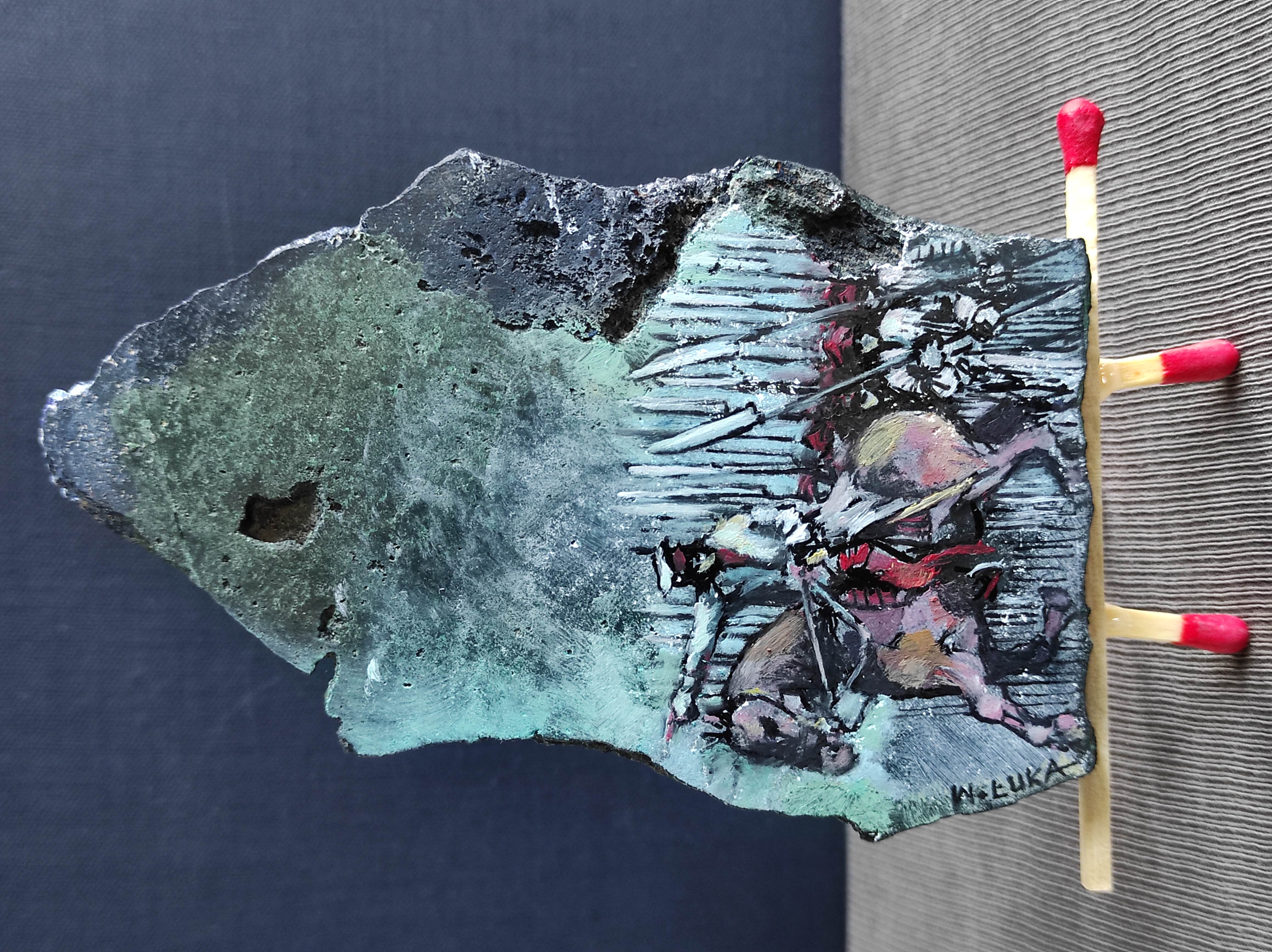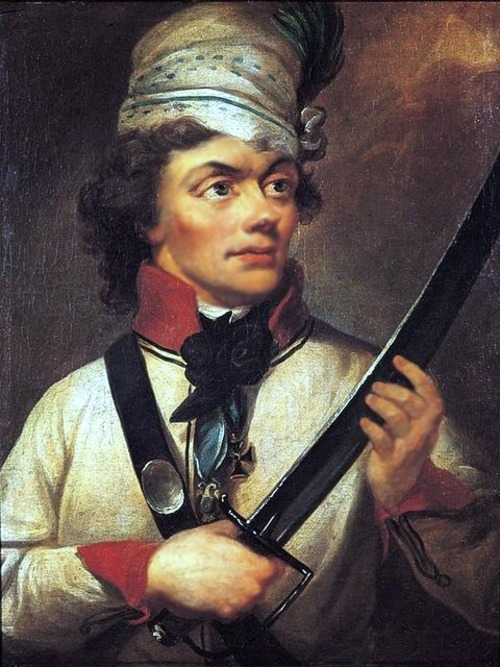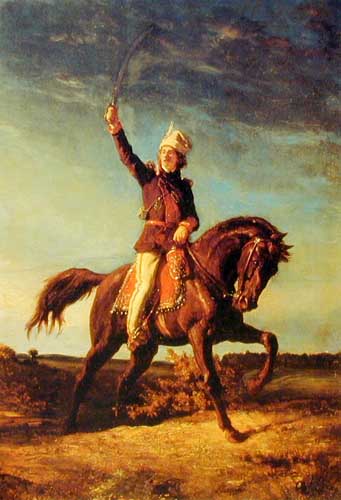1. Life
Tadeusz Kościuszko's life journey spanned from his birth in the Polish-Lithuanian Commonwealth to his final years in exile, marked by military service, political activism, and a steadfast commitment to democratic and humanitarian ideals.
1.1. Early Life and Education
Kościuszko was born in February 1746, either on the 4th or 12th, in the village of Mereczowszczyzna (МерачоўшчынаMieračoŭščynaBelarusian, MereczowszczyznaPolish), then part of the Brest Voivodeship of the Grand Duchy of Lithuania, near present-day Kosava, Belarus. He was the youngest child in a Belarusian noble family whose ancestors had served at the court of Zygmunt I. Reflecting the coexistence of Eastern Orthodoxy and Roman Catholicism in the region, he was baptized in both churches, receiving the baptismal names Andrzej and Tadeusz.
At the age of 20, Kościuszko graduated from the Corps of Cadets in Warsaw, Poland. Following the outbreak of the Bar Confederation civil war in 1768, he moved to France in 1769 to pursue further military studies. He spent five years, from 1769 to 1774, undergoing military education in Germany, Italy, and France. After returning to Poland in 1774, two years after the First Partition of Poland, he worked as a tutor for the family of Józef Sylwester Sosnowski. An attempt by Kościuszko to elope with Sosnowski's daughter resulted in him being severely beaten by her father's retainers, after which he returned to France.
1.2. Exile and Later Years
After the failure of the Kościuszko Uprising and his capture in 1794, Kościuszko was imprisoned by the Russian authorities. In 1796, following the death of Catherine the Great, he was pardoned by her successor, Paul I of Russia, and subsequently emigrated to the United States.
In 1798, Kościuszko returned to Europe, settling in France. He did not, however, align himself with Napoleon's imperial ambitions or his policies regarding Poland. Kościuszko then relocated to Switzerland, where he lived until his death. He died in Solothurn, Switzerland, on October 15, 1817, at the age of 71, after contracting typhus. The renowned Russian playwright Mikhail Artsybashev was Kościuszko's great-grandson.
2. Major Activities and Achievements
Kościuszko's career was marked by significant military and political contributions across two continents, cementing his legacy as a champion of liberty and national independence.
2.1. American Revolutionary War
From 1776 to 1783, Kościuszko served as a volunteer in the American Revolutionary War. He acted as an aide to George Washington, the Commander-in-Chief of the Continental Army. A talented military engineer, Kościuszko designed and supervised the construction of advanced fortifications, including the crucial defenses at West Point, New York, which were vital to the American war effort. His engineering prowess was widely recognized. In 1783, in recognition of his invaluable contributions, the Continental Congress promoted him to the rank of brigadier general. During his time in America, he was profoundly influenced by the liberal ideas of figures such as Thomas Jefferson.
2.2. Activities in the Polish-Lithuanian Commonwealth
Kościuszko returned to Poland in 1784. In 1789, he was appointed a major general in the Polish-Lithuanian army. He became actively involved in the political reforms leading up to the May 3rd Constitution, participating as a member of the Four-Year Sejm (parliament) in 1791. With a centrist-left political stance, he played a crucial mediating role between the moderate and radical reform factions within the "Patriotic Party" (Stronnictwo PatriotycznePolish), which spearheaded the Four-Year Sejm. His skillful political maneuvering was evident in his efforts to bridge the divide between these groups on parliamentary matters.
Shortly after the constitution's adoption, Kościuszko fought in the Polish-Russian War of 1792 against the Russian Empire's interference, which aimed to suppress the new constitution. Despite his efforts, the Polish forces were defeated. This defeat led to his brief exile in Leipzig and Paris.
2.3. Kościuszko Uprising
After the Second Partition of Poland in 1793, Kościuszko returned to his homeland. In March 1794, he organized and led a national uprising against the Russian Empire and the Kingdom of Prussia, known as the Kościuszko Uprising. He successfully rallied both the Jacobin faction and a significant number of peasants to his cause. The uprising began in Kraków.

One of the uprising's most significant engagements was the Battle of Racławice, where Kościuszko's forces achieved a major victory over the Russian army. For a time, his forces controlled Warsaw and Vilnius. However, the Russian and Prussian armies, continuously reinforced, eventually overwhelmed the Polish insurgents. In October 1794, Kościuszko himself was wounded in battle and captured by the Russian forces. The defeat of the Kościuszko Uprising ultimately led to the Third Partition of Poland in 1795, which resulted in the complete dissolution of the Polish-Lithuanian Commonwealth and the end of Polish independent statehood for 123 years.
3. Philosophy and Ideals
Kościuszko's intellectual and ideological framework was deeply rooted in liberal principles, significantly shaped by his interactions with American figures like Thomas Jefferson. He was a staunch advocate for democracy and human rights, believing in the inherent equality of all people.
His commitment to these ideals was most powerfully demonstrated in his will, written in 1798. In this document, Kościuszko bequeathed his American assets to fund the education and freedom of enslaved people in the United States. This act underscored his profound opposition to slavery and his dedication to universal human liberty. However, the execution of his will proved to be challenging, and the funds he left were not ultimately used for their intended purpose as specified in his testament.
4. Personal Life
Born into a Belarusian noble family, Tadeusz Kościuszko's personal life, though less documented than his military and political endeavors, offers glimpses into his character. An anecdote from his time in America highlights his wit: when George Washington remarked that Kościuszko's surname was difficult to pronounce, Kościuszko reportedly retorted, "George, my name is hard to pronounce? Your Washington (Wa-shing-ton) and my Kościuszko (Koś-ciu-szko) both have only three syllables!"
An earlier episode in his life involved an attempted elopement with the daughter of Józef Sylwester Sosnowski, for whom he worked as a tutor. This attempt was unsuccessful and resulted in him being physically assaulted by her father's retainers. Later in life, the Russian playwright Mikhail Artsybashev was Kościuszko's great-grandson.
5. Assessment and Legacy
Tadeusz Kościuszko is widely regarded as a pivotal figure in the history of several nations, holding the status of a national hero in Poland, Lithuania, Belarus, and the United States. His historical assessment consistently highlights his unwavering commitment to the principles of freedom, democracy, and national self-determination.


His achievements, particularly his military engineering contributions in the American Revolutionary War and his leadership of the Kościuszko Uprising, had a profound impact on subsequent generations, inspiring future struggles for independence and democratic reforms. His progressive ideals, notably his advocacy for the rights of peasants and his explicit will to free and educate enslaved people, underscore his enduring social and political legacy as a champion of human rights and social justice. Kościuszko's life and actions continue to symbolize the fight against oppression and the pursuit of national sovereignty and democratic governance.
6. Commemoration and Memorials
Numerous monuments, places, and institutions around the world have been established or named in honor of Tadeusz Kościuszko, commemorating his contributions and life. These memorials serve as lasting tributes to his legacy as a national hero and advocate for freedom.
- Kościuszko Mound: An artificial hill in Kraków, Poland, constructed to honor Tadeusz Kościuszko.
- Camp Kościuszko: A United States Army base located in Poznań, Poland, named in his honor.
- Mount Kosciuszko: The highest mountain on the Australian continent, named after him.
- No. 303 Polish Fighter Squadron: A Royal Air Force fighter squadron, famously composed of Polish Air Force pilots who escaped after the Polish invasion at the start of World War II. The squadron was named in recognition of Kościuszko's valor and fighting spirit.